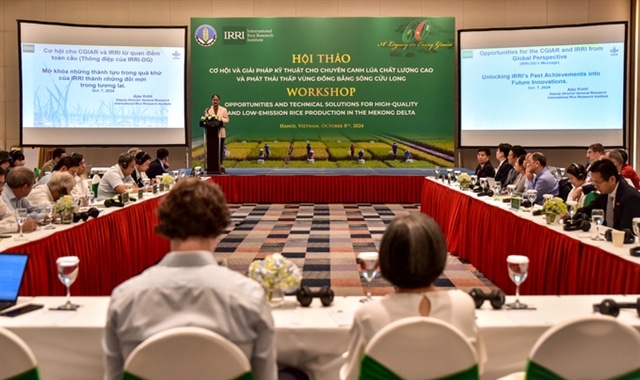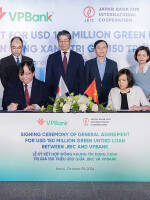
Carbon credits could become a key measure of success in sustainable rice farming, according to Dr Nguyen Do Anh Tuan, Director General of the International Cooperation Department of the Ministry of Agriculture and Rural Development (MARD).
Speaking at a workshop in Hanoi on October 8, he emphasised the significance of carbon credits in achieving low-emission rice farming in the Mekong Delta.
The event, jointly organised by the International Rice Research Institute (IRRI) and the MARD, focused on technical solutions for high-quality, low-emission rice production in the region. It provided insight into research on climate-adaptive rice varieties and sustainable cultivation practices, reflecting the global shift towards reducing emissions in agriculture.
IRRI also presented its support for localities involved in Vietnam’s scheme for one million hectares of high-quality, low-emission rice linked to green growth by 2030. This support includes the development of a measurement, reporting, and verification system, as well as capacity-building initiatives.
Dr Tuan said the core objective of the programme is to reorganise rice production by establishing specialised farming zones that follow sustainable methods. These zones play a crucial role in adapting to climate change and achieving emissions reduction targets.
He noted that verified carbon credits will serve as clear evidence of progress in sustainable rice cultivation.
MARD has already finalised technical guidelines for low-emission rice production in the Mekong Delta and developed plans to enhance capacity among agricultural cooperatives.
In the coming seasons, the ministry will expand pilot projects to measure carbon emissions from rice farming.
To support these efforts, MARD has reviewed the state of irrigation infrastructure in the scheme’s target areas. It has compiled provincial proposals and is now seeking resources to upgrade canal systems and transportation networks in these specialised farming zones.
A recent survey of 12 participating localities indicated that approximately 3 billion USD in funding will be needed to meet the scheme’s goals by 2030.
Around 60% of this total is expected to come from businesses and farmer organisations, while concessional loans will cover the remainder.
Tuan said that infrastructure investment is the biggest challenge and suggested special mechanisms to access foreign loans to address this bottleneck.
Barriers to reducing emissions
IRRI experts presented promising data at the workshop, showing that low-emission rice farming technologies could cut methane emissions by as much as 65%.
Specifically, using alternate wetting and drying (AWD) irrigation methods can reduce methane emissions by 33%.
Other techniques, such as avoiding straw burning and incorporating straw into the soil, further contribute to emissions reductions.
However, Le Thanh Tung, Deputy Director of the Department of Crop Production, pointed out that many localities still focus on short-term economic goals and food security, while emissions reduction is often overlooked.
“The emphasis on immediate yields and income has slowed the implementation of environmental mitigation measures in rice production,” he said.
Another obstacle is the lack of clear incentives for farmers to adopt low-emission farming methods. Without specific policies encouraging these changes, many farmers remain reluctant to abandon traditional high-emission practices.
The high cost of adopting low-emission techniques further complicates efforts to scale up these methods, particularly for small-scale farmers.
Infrastructure also poses a challenge.
In many areas, inadequate irrigation systems hinder the adoption of AWD and other advanced technologies. This lack of uniformity across regions makes it difficult to implement low-emission practices consistently.
At the workshop, former MARD Deputy Minister Bui Ba Bong, who now chairs the Vietnam Rice Industry Association (VIETRISA), noted that while farmers may not fully grasp the concept of emissions reduction, they are keenly aware of the need for sustainable production.
He suggested that the term green rice might resonate more strongly with farmers, who are already familiar with environmentally friendly farming practices.
VIETRISA is currently working to build a sustainable rice brand and aims to register the trademark “Green and Low-Emission Vietnam Rice” by the end of this month.
Can Tho is one of the provinces where MARD has piloted a 50 hectare low-emission rice farming model.
Pham Thi Minh Hieu, chief of the Department of Crop Production and Plant Protection, said despite the region’s limited experience with large-scale demonstration models, the initial results have been promising.
Mechanisation expert Phan Hieu Hien said expanding low-emission farming to one million hectares requires technological infrastructure to complement advances in biology and agronomy.
He called for stronger collaboration between MARD and the Ministry of Industry and Trade to boost mechanisation, which is essential for improving production and strengthening the rice value chain.
This integrated approach could position Vietnam as a leader in global low-emission rice production./.
(VNA)




